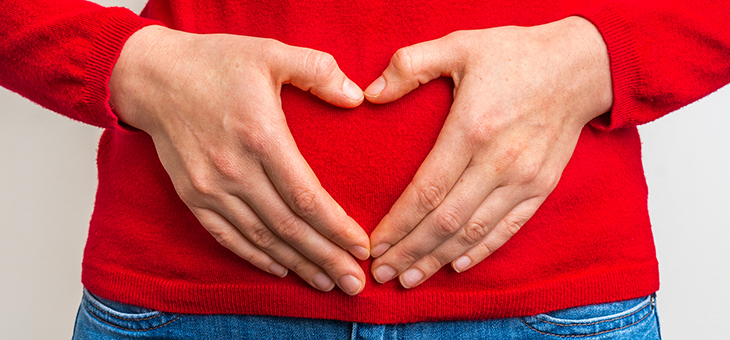Most people experience occasional digestive disturbances – but for some, these can be symptoms of an underlying health problem. Plus, gut health isn’t just about what’s going on in the toilet department or under your waistband – digestive disorders can have a wide impact and affect people physically and psychologically in numerous ways.
Concerned about your own gut health? Remember, these symptoms usually don’t mean anything serious is going on, plus food sensitivities and irritable bowel syndrome (IBS) can be extremely common and may cause similar effects. The good news is, whatever the underlying cause, lots can be done to help, so it’s always best to get your symptoms checked with a doctor and find the advice that’s best for you.
Here are eight – not always obvious – signs that something might be up with your gut.
1. Sudden allergies or intolerances
Although sudden allergies can have many causes, one of them can be your gut. Impaired digestion can lead your body to lack the enzymes it needs to break down foods in full (which is why many people have temporary lactose intolerance after a bout of food poisoning).
Food intolerance is a very common and difficult problem for lots of people. It can cause gastrointestinal symptoms such as bloating, diarrhoea, and pain; neurological symptoms such as headache and fatigue; and dermatological conditions such as tingling, burning and itching. Sufferers know that other people are able to eat foods that for them are ‘triggers’ without any problems and that something must be causing the symptoms. Food intolerance is different from food allergy.
Allergies are caused by an immune reaction, where an allergen – often food or chemicals – is eaten or encountered, causing a breakdown of mast cells in the blood and tissues. True allergies can cause life-threatening anaphylactic shock – collapse and failure of the cardio-respiratory system, where you can’t get blood and oxygen around the body. But most allergies are not life-threatening and milder allergic symptoms include rashes, swelling, redness, watering eyes, wheeziness, itchiness and sneezing.
2. Skin breakouts
Our gut is closely connected to our skin. Many people with psoriasis and eczema also struggle with gut issues. Often, if our gut can’t do a proper job at eliminating waste, our skin (essentially another elimination route) takes the strain, and breakouts become more common.
Since everyone’s body is different, foods affect people in various ways. There’s no one right answer to solve food-related skin problems. There is a huge range of pro-inflammatory foods, but the most problematic ones tend to be cow’s milk, sugar, alcohol, gluten.
Cow’s milk is perhaps the most talked about, and the most studied. Researchers have found that some cow’s milk contains the growth hormone IGF-1, which is known to cause inflammation in the body.
Anything that causes a spike in blood sugar can, theoretically, increase inflammation and insulin levels, therefore leading to pimples and excess oil.
3. Fatigue
Fatigue is a big sign something could be wrong with your gut. In fact, some studies show that those with chronic fatigue syndrome may have different gut bacteria to those who don’t. Other gut conditions, such as inflammatory bowel disease (IBD), lead to fatigue due to malnutrition and nutritional deficiencies.
The majority of the body’s serotonin, a hormone that affects mood and sleep, is produced in the gut. So gut damage can also impair your ability to sleep well, leading to fatigue.
4. Mouth ulcers
Our digestive tract begins in the mouth and mouth ulcers can be a sign of gut issues or food intolerances. Certain food additives that provide colour or chemicals used to replicate tastes like cinnamon or chocolate in drinks can be common culprits, but an elimination diet is needed to be pinpoint the source of discomfort.
Both coeliac disease and IBD can present as mouth ulcers. They can also be a sign of certain deficiencies – such as B12.
5. Bloating and gas
Perhaps the most common symptom and one of the most uncomfortable.
We all pass gas, but excess burping can be a sign of low stomach acid or altered gut bacteria. Painful bloating occurs when certain compounds in foods irritate the gut lining, causing it to become inflamed and hindering it from absorbing nutrients from the food consumed.
6. Food cravings
It’s thought the bacteria in our gut can impact the food cravings we have.
Each gut microbe has its own appetite and they know what they want. Yeasts want sugar, Bacteroidetes relish fat, Prevotella covet carbs and Bifidobacteria are big fans of fibre. It’s thought that they can even produce toxins that make us feel miserable if they don’t get what they’re after.
Individuals with candida may also constantly crave sugary food.
7. Brain fog
Brain fog is defined as lacking focus, mental clarity or feeling confused often. What’s this got to do with our gut? Plenty! More research than ever is looking at our gut-brain connection and brain fog is common in coeliac disease, IBD and food intolerances. It’s not known exactly why this is the case, but hopefully research will reveal the answers soon.
8. Anxiety
Anxiety can be crippling and, of course, is always something for which you should seek medical advice. However, a clear connection between our microbiota and the genes in our body that regulate our emotions has been found. This study showed anxiety was related to a dysbiosis of intestinal microbiota.
Of course, it’s difficult to determine whether we’re anxious because of our gut issues, or whether it’s a symptom in itself.
Do you suffer from gut issues? Do you need to limit your intake of certain foods?
– With PA
If you enjoy our content, don’t keep it to yourself. Share our free eNews with your friends and encourage them to sign up.
Related articles:
https://www.yourlifechoices.com.au/health/wellbeing/our-gut-has-never-been-more-important
https://www.yourlifechoices.com.au/health/your-health/gut-health-linked-to-alzheimers
https://www.yourlifechoices.com.au/health/your-health/lack-of-sleep-can-hurt-your-gut
Disclaimer: This article contains general information about health issues and is not advice. For health advice, consult your medical practitioner.

